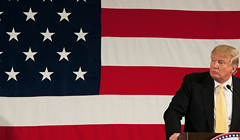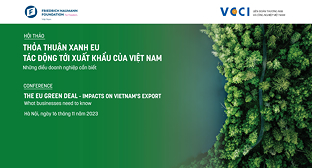Trump Says Solar Tariff Decision Is Coming ‘Pretty Soon’
19/01/2018 12:00

The president complained that “everybody goes out of business” when government-subsidized panels are dumped in the U.S. market.
President Donald Trump said Wednesday he would soon announce a decision on whether to impose tariffs on imported solar cells and modules in the high-stakes Section 201 trade case.
The president criticized American trading partners for dumping subsidized solar products in the U.S. market, causing distress for domestic solar panel manufacturers.
“You know, they dump ‘em -- government-subsidized, lots of things happening -- they dump the panels, then everybody goes out of business,” Trump said in an interview with Reuters.
Trump has until Jan. 26 to issue a decision on the Section 201 petition, and the White House is expected to meet the statutory deadline.
Asked when his decision would be announced, the president told Reuters: “Pretty soon. Honestly, pretty soon.”
Tensions have been riding high as the Jan. 26 deadline approaches. Politico reported a decision could come as soon as Wednesday, but a White House official later stated there is no set date for a solar trade announcement.
The official said the administration is "coordinating an exhaustive process...that ensures any and all consequences of recommendations sent to the president -- be they economic, national security or otherwise -- are fully considered and researched."
U.S.-based crystalline-silicon solar PV manufacturers Suniva and SolarWorld Americas filed the Section 201 petition last year, arguing that they could not compete with a flood of cheap imports. The petitioners have repeatedly pointed a finger at China, which they claim has cheated the market through subsidies and avoided duties levied in previous trade cases by shifting production to other countries.
The Section 201 case is unique in that it gives the president broad discretion and can be applied globally. Also, unlike the 2012 anti-dumping and countervailing duties solar case, 201 petitioners do not have to prove foreign companies are "dumping" products at below-market prices. Instead, Suniva and SolarWorld need only show that imports have harmed the domestic industry in order to seek emergency trade protections from from virtually every other country in the world.
Both supporters and opponents of new solar tariffs met with U.S. Trade Representative Robert Lighthizer earlier this month to make their case. Following the meeting, a Suniva spokesperson said the company “has and will continue to focus on revitalizing the American solar manufacturing industry that has been decimated by China's cheating."
President Trump has said he's intent on taking strong trade action against China. A supplemental report Lighthizer requested from the U.S. International Trade Commission (U.S. ITC) explicitly stated that China implemented a series of policy measures and government support programs favoring solar product manufacturing that “directly contradicted the obligations that China committed to undertake" in joining the World Trade Organization. The report could be used to defend new solar tariffs from challenges at the WTO.
The majority of crystalline-silicon solar PV products subject to the tariffs are made in parts of Asia other than China, by both American and Chinese companies. Ironically, the higher the tariff, the more likely foreign manufacturers are to challenge the decision or come to the negotiating table, according to Rhone Resch, former president and CEO of the Solar Energy Industries Association.
“The industry should be prepared for high tariffs, in excess of the U.S. ITC's recommendations,” he said, referring to the set of proposed tariffs delivered to the White House last fall.
While the president spoke out against product-dumping this week, he did not say how he will rule on the solar trade case, giving hope to many that he will opt for a more nuanced solution that balances the needs of U.S. panel manufacturers with the rest of the U.S. solar industry, which relies heavily on imported solar products.
As GTM reported, the Section 201 statute allows Trump to delay implementation of a remedy decision by an additional 90 days in order to pursue a “negotiated settlement.” He can also issue a delay to allow certain countries and companies to request tariff exemptions.
Trade-case opponents continued to urge the president to reject solar tariffs this week. On Wednesday, current SEIA President and CEO Abigail Ross Hopper sent a personal letter to Trump that stated that somewhat counterintuitively, tariffs will actually kill American manufacturing jobs, "the very jobs we all want to grow." Democratic Senator Martin Heinrich from New Mexico also weighed in on the trade case Wednesday, noting that this is President Trump's opportunity to "stand up for American workers."
The USA Today editorial board wrote this week that "raising prices on imported solar cells and panels would hurt a burgeoning domestic solar industry that employs the kind of 'forgotten' Americans whom Trump champions: small contractors who employ blue-collar workers earning a median of $26 an hour; one in 10 are veterans."
Source: Green Tech Media
Các tin khác
- More efforts needed to maintain export growth to China: Insiders (24/04/2024)
- Shadow trade minister calls for greater focus on removal of Chinese trade barriers (24/04/2024)
- New U.S. Solar Panel Tariff Intensifies Sino-American Green Tech War (24/04/2024)
- It is expected that there are higher orders and revenue in the second quarter from European businesses (24/04/2024)
- U.S. Ceramic Manufacturers Seeking Tariffs Against Indian Import (24/04/2024)
 Home
Home
 About Us
About Us




















